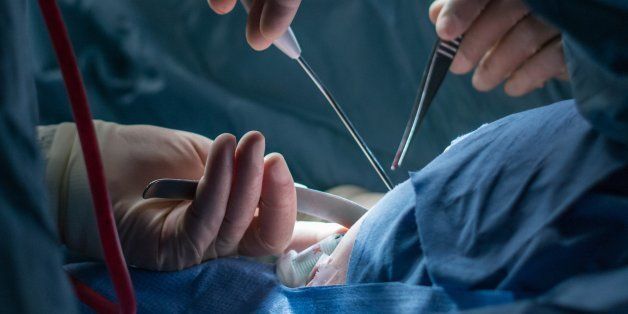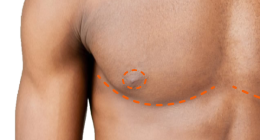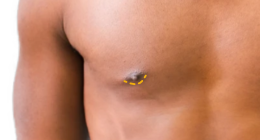Sponsored Article
Is Top Surgery Medically Necessary?
"Providing gender-affirming care to patients improves their mental health, reduces rates of depression, and decreases the risk of suicide." — Dr. Aneesh Gupta and Dr. Jeffrey Marvel, 2024.
Gender-affirming surgery procedures, such as Top Surgery, are recognized as medically necessary reconstructive surgeries designed to treat gender dysphoria. For transmasculine individuals, Top Surgery is the most frequently performed procedure, with evidence consistently demonstrating its effectiveness in improving quality of life and reducing the symptoms of gender dysphoria.
However, despite growing acknowledgment of its medical necessity, insurance companies often deny coverage for Top Surgery. Trans and non-binary individuals are frequently asked to justify their need for this procedure, whether by insurers, loved ones, or others. If you find yourself needing to explain the medical necessity of Top Surgery, this evidence-based summary offers a clear, science-backed rationale for why the surgery is a vital step in affirming your gender identity and improving mental and physical well-being.

Medical Necessity Defined
Medicare defines medical necessity as: "Services or supplies that are needed to diagnose or treat your medical condition and that meet accepted standards of medical practice." In other words, the treatment, test, or procedure is necessary for your health or to treat a diagnosed medical problem.
Blue Cross Blue Shield's definition of medical necessity asserts that the treatment in question must be clinically appropriate and in accordance of generally accepted standards of medical practice.
"Generally accepted standards of medical practice means standards that are based on credible scientific evidence published in peer-reviewed medical literature generally recognized by the relevant medical community, Physician Specialty Society recommendations and the views of Physicians practicing in relevant clinical areas and any other relevant factors."
The Scientific Evidence That Backs Top Surgery
There is a well established body of peer-reviewed medical research that demonstrates the effectiveness and medical necessity of Top Surgery as a form of treatment for many people diagnosed with gender dysphoria.
Proven Benefits of Top Surgery:
1. Top Surgery decreases body dissatisfaction and gender dysphoria in social interactions.
Tim C. van de Grift et al., Body Image of Transmen: Multidimensional Measurement and the Effects of Mastectomy, 13 J. of Sexual Medicine 1778, 1785 (2016).
[FULL TEXT]
2. Top Surgery allows people to be recognized as male by others and facilitates living in accordance with a male social role.
Claes K, D'Arpa S, Monstrey SJ. Chest Surgery for Transgender and Gender Nonconforming Individuals. Clin Plast Surg. 2018 Jul;45(3):369-380.
3. Top Surgery has a high satisfaction rate and improves quality of life. In this 2017 study, the satisfaction rate by trans men after having Top Surgery was 94%. Respondents also reported a relatively positive quality of life, confirming that medical transition alleviates feelings of gender dysphoria and improves life satisfaction.
Tim C. van de Grift et al., Surgical Satisfaction, Quality of Life and Their Association after
Gender Affirming Surgery, J. of Sex & Marital Therapy 1, 4 (2017).
[FULL TEXT]
Other studies have also shown that Top Surgery has a clear positive impact on the lives of patients:
- Nolan I, Poudrier G, Motosko C, Cook T, Saia W, Gothard M, Hazen A. Continued Barriers to Top Surgery among Transgender Men. Plast Reconstr Surg. 2019 Dec 2.
Top Surgery is a medically-necessary intervention for those who seek it, and is associated with higher overall subjective quality of life, and lower rates of gender dysphoria, substance abuse, HIV, and suicide.
- Ashli A. Owen-Smith, Association Between Gender Confirmation Treatments and Perceived Gender Congruence, Body Image Satisfaction, and Mental
Health in a Cohort of Transgender Individuals, 15 J. of Sexual Med. 591 (2018).
Researchers in this study demonstrated how Top Surgery reduces depression and anxiety and improved body satisfaction. - Grace Poudrier et al., Assessing Quality of Life and Patient-Reported Satisfaction with Masculinizing Top Surgery: A Mixed-Methods Descriptive Survey Study, Plastic and Reconst. Surg. 272 (2018).
Improved quality of life and reduced gender dysphoria, and no regret aside from a few aesthetic concerns, were reported in this study. - Christina Richards & J. Barrett, The case for bilateral mastectomy and male
chest contouring for the female-to-male transsexual, Annals of the Royal College
of Surgeons of England 93 (2013) [FULL TEXT]
This literature review recognized an improvement in quality of life following Top Surgery. - Romain Weigert, Eric Frison, Quentin Sessiecq, Khalid Al Mutairi, Vincent Casoli. Patient satisfaction with breasts and psychosocial, sexual, and physical well-being after breast augmentation in male-to-female transsexuals. Plast Reconstr Surg. 2013 Dec;132(6):1421-9.
The results from this study suggest that the gains in breast satisfaction, psychosocial well-being, and sexual well-being after undergoing Top Surgery are statistically significant and clinically meaningful in the long term. - Lisa Nelson et al., Transgender Patient Satisfaction Following Reduction Mammaplasty, 62 J. of Plastic, Reconstructive & Aesthetic
Surgery 331, 334 (2009).
This study found that Top Surgery resulted in high patient satisfaction and improved patients' lives.
Experts Agree On Top Surgery
At this time, there is no physician specialty board or society for Gender Surgery that oversees or certifies surgeons practicing in the field. However, leading medical organizations in the United States agree that gender-affirming care is the most effective treatment for gender dysphoria. The American Medical Association, the American Psychological Association and the American Psychiatric Association have all issued position statements supporting coverage for medically necessary treatment as determined by a patient and their health care provider.
The World Professional Association for Transgender Health (WPATH) has also issued a position statement on the medical necessity of gender-affirming surgery, noting that clinical and peer-reviewed evidence shows that gender-affirming care has proven to be beneficial and effective in the treatment of gender dysphoria and plays an "undisputed role in contributing toward favorable outcomes."
Furthermore, the WPATH Standards of Care recognize that for those who do not experience relief from other treatments, "surgery is essential and medically necessary to alleviate their gender dysphoria . . . relief from gender dysphoria cannot be achieved without modification of their primary and/or secondary sex characteristics to establish greater congruence."
 Among surgeons offering gender-affirming care, there's no debate about the life-saving nature of Top Surgery for patients who require it to align with their gender identities. "It allows them to feel comfortable in their own bodies," says Dr. Gabriel Del Corral, a plastic surgeon with MedStar Health in Baltimore and Washington D.C. who specializes in gender-affirming surgeries. "We're talking about a population where 40 percent have attempted suicide, and for some patients, the surgery can be the final step that allows them to finally flower into who they are as a person."
Among surgeons offering gender-affirming care, there's no debate about the life-saving nature of Top Surgery for patients who require it to align with their gender identities. "It allows them to feel comfortable in their own bodies," says Dr. Gabriel Del Corral, a plastic surgeon with MedStar Health in Baltimore and Washington D.C. who specializes in gender-affirming surgeries. "We're talking about a population where 40 percent have attempted suicide, and for some patients, the surgery can be the final step that allows them to finally flower into who they are as a person."
Medical Necessity and Insurance Coverage
"Professionals who provide services to patients with gender conditions understand the necessity of SRS, and concur that it is reconstructive, and as such should be reimbursed, as would any other medically necessary treatment." — Principles of Transgender Medicine and Surgery, edited by Randi Ettner, Stan Monstrey, Eli Coleman, 2007.
Health insurance companies in the U.S. provide coverage for health-related services that they determine to be medically necessary and the majority of insurance company medical policies on gender dysphoria treatments now recognize Top Surgery as medically necessary for adults. Nevertheless, some insurance companies still deny coverage, forcing patients to rightfully resort to appealing the decision. Proving that the surgery is a medical necessity is the key to overturning the insurance company's decision.
Not every person with gender dysphoria has the need to undergo surgery, but for those who do, Top Surgery is medically necessary and has been scientifically proven to be effective at treating gender dysphoria and improving quality of life.
Related links:
Insurance How-To Guide
This guide walks you through the process of getting insurance coverage for Top Surgery, including how to file an appeal and reverse a denial of coverage.
Health Insurance - Appealing a Denial
Learn about the different types of appeals available to challenge a denial of coverage for transgender-related health care. This section covers how to appeal medical necessity denials only, not denials due to blanket exclusions. It also covers things outside of the formal appeals process that might help overturn a denial.
Your Best Defense: the Letter of Medical Necessity
The Letter of Medical Necessity is a potent tool. It is a LEGAL document wherein your doctor argues why you need a specific medical treatment or test.
Last updated: 01/30/25




